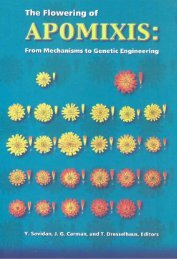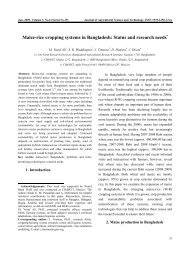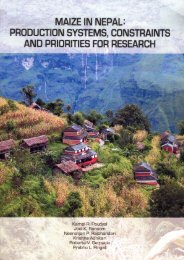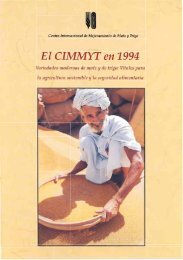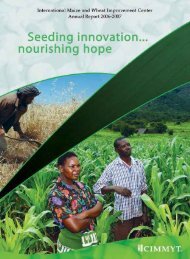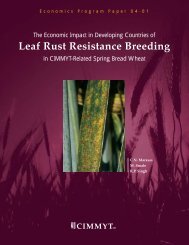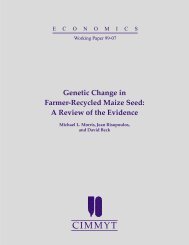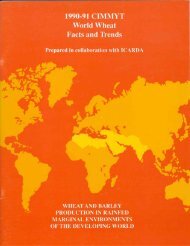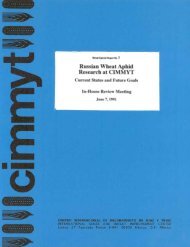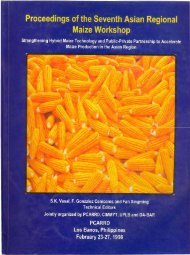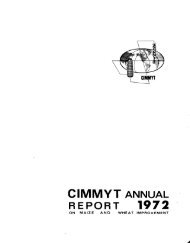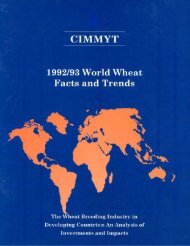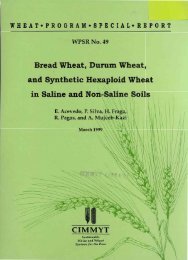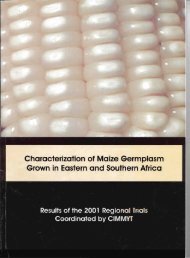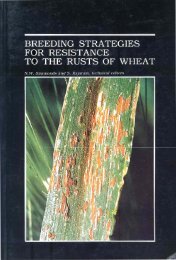the Symposium on Wheats for More Tropical Environments - cimmyt
the Symposium on Wheats for More Tropical Environments - cimmyt
the Symposium on Wheats for More Tropical Environments - cimmyt
- No tags were found...
You also want an ePaper? Increase the reach of your titles
YUMPU automatically turns print PDFs into web optimized ePapers that Google loves.
133must also dem<strong>on</strong>strate a yieldadvantage. Fur<str<strong>on</strong>g>the</str<strong>on</strong>g>r. farmer preference<strong>for</strong> S<strong>on</strong>alika is so pervasive that it isnearly c<strong>on</strong>sidered syn<strong>on</strong>Ymous withwheat.Against this backdrop of variable datesof planting. water availability andvarietal preference. white-seededvarieties must be developed which canbe planted late and/or <strong>on</strong> drylands.while also resp<strong>on</strong>ding favorably to earlyplanting and/or irrigated c<strong>on</strong>diti<strong>on</strong>s. Inall probability. <str<strong>on</strong>g>the</str<strong>on</strong>g> perfect. miraclevariety will not be found that <str<strong>on</strong>g>the</str<strong>on</strong>g>separameters suggest is needed;obViously. some compromises will benecessary.The development of a number ofdifferent varieties. each with itscharacteristics favorable to a givensituati<strong>on</strong>. is always suggested.However. 75% of <str<strong>on</strong>g>the</str<strong>on</strong>g> annual wheatseed requirement is stored by farmersand. suprisingly. a good percentage ofsuch seed survives <str<strong>on</strong>g>the</str<strong>on</strong>g> humid m<strong>on</strong>so<strong>on</strong>seas<strong>on</strong> with a high level of germinati<strong>on</strong>.They cannot store seed safely <strong>for</strong> morethan six m<strong>on</strong>ths. nor are <str<strong>on</strong>g>the</str<strong>on</strong>g>y willing tostore a number of varieties. selected <strong>for</strong><str<strong>on</strong>g>the</str<strong>on</strong>g> different kinds of situati<strong>on</strong>s <str<strong>on</strong>g>the</str<strong>on</strong>g>ymay have <strong>on</strong> <str<strong>on</strong>g>the</str<strong>on</strong>g>ir own land (and whichmay change annually). Fur<str<strong>on</strong>g>the</str<strong>on</strong>g>r. <str<strong>on</strong>g>the</str<strong>on</strong>g>nati<strong>on</strong>al seed producti<strong>on</strong> program.although producing good quality seed.is not sufficiently sophisticated toefficiently grow and distribute anumber of different varieties insufficient quantities that demandrequires. The present program. instead.is directed toward <str<strong>on</strong>g>the</str<strong>on</strong>g> selecti<strong>on</strong> of <str<strong>on</strong>g>the</str<strong>on</strong>g>maximum amount of flexibility ingermplasm. in terms of its droughttolerance/favorable resp<strong>on</strong>se toincreased water availability. andtolerance to late planting/favorableresp<strong>on</strong>se to earlier planting.Material is available with maturitiesand drought resistance comparable toS<strong>on</strong>alika. but with no particular yieldadvantage. Yields. of course. generallydecline with decreasing time-tomaturity.The probability of selecting avariety with similar durati<strong>on</strong> anddesirable characteristics of S<strong>on</strong>alika.and with a c<strong>on</strong>sistent yield advantage.is quite low. Ra<str<strong>on</strong>g>the</str<strong>on</strong>g>r than to exclusivelyselect <strong>for</strong> varieties that are similar toS<strong>on</strong>alika. selecti<strong>on</strong> is also made <strong>for</strong>varieties which. under both irrigatedand water-stress c<strong>on</strong>diti<strong>on</strong>s. are ofsomewhat l<strong>on</strong>ger durati<strong>on</strong> thanS<strong>on</strong>alika (but no more than a weekl<strong>on</strong>ger). They must also be tolerant toheat-<strong>for</strong>ced maturati<strong>on</strong> while stillmaintaining a reas<strong>on</strong>able yield andseed quality and. if planted at a morefavorable date. yield c<strong>on</strong>sistently better.All pre-trial material. irrigated ordryland. is selected at a favorable dateof planting (November 15 to 30) and alate date (December 15 to 30). at least<strong>on</strong>ce be<strong>for</strong>e being allowed to progress to<str<strong>on</strong>g>the</str<strong>on</strong>g> nati<strong>on</strong>al screening nursery. <str<strong>on</strong>g>the</str<strong>on</strong>g>Bangladesh Screening Nursery (BSN).Individual plants from internati<strong>on</strong>al andlocally generated segregating materialare alternately selected at favorable andlate dates of planting up to <str<strong>on</strong>g>the</str<strong>on</strong>g> F6generati<strong>on</strong> (e.g.• plants are selected at afavorable date in <str<strong>on</strong>g>the</str<strong>on</strong>g> F2. F4 and F6generati<strong>on</strong>s. and at a late date in <str<strong>on</strong>g>the</str<strong>on</strong>g> F3and F5 generati<strong>on</strong>s). Lines may be cutin bulk if selected <strong>for</strong> <str<strong>on</strong>g>the</str<strong>on</strong>g> BSN startingwith F6; <str<strong>on</strong>g>the</str<strong>on</strong>g> F7 and F8 generati<strong>on</strong>s arealso planted at a favorable date.However. all F2 material is first selectedunder irrigated c<strong>on</strong>diti<strong>on</strong>s; seeds ofselected plants are divided and <str<strong>on</strong>g>the</str<strong>on</strong>g>populati<strong>on</strong>s are <str<strong>on</strong>g>the</str<strong>on</strong>g>reafter tested atalternate dates. simultaneously underboth irrigated and water-stressc<strong>on</strong>diti<strong>on</strong>s.Lines selected <strong>for</strong> <str<strong>on</strong>g>the</str<strong>on</strong>g> BSN are plantedat seven locati<strong>on</strong>s; three of <str<strong>on</strong>g>the</str<strong>on</strong>g> sets areplanted under water-stress c<strong>on</strong>diti<strong>on</strong>s.Lines of good appearance. with leaf rustresistance. absence of physiogenic leafand spike problems. and yielding well<strong>for</strong>med.clean seeds in a majority of



